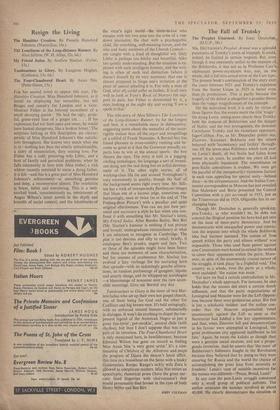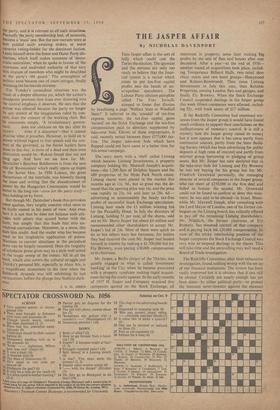The Fall of Trotsky
The Prophet Unarmed. By Isaac Deutscher. (0.U.P., 38s.) The Prophet Unarmed. By Isaac Deutscher. (0.U.P., 38s.) MR. DEUTSCHER'S Prophet Armed was a splendid panorama of Trotsky's years of triumph. It could,
indeed, be faulted in certain respects. But, even
though it was constantly unfair to the enemies of the Bolsheviks, it was not so in Professor Carr's
unpleasant power-mysticism way, nor, on the whole, did it fall into actual error of the Carr type. The present book's continuation of the story over the years between 1921 and Trotsky's expulsion from the Soviet Union in 1929 is better even than its predecessor. This is partly because the tragedy of the defeat is altogether a grander theme than the vulgar magnificences of the triumph.
On the individual level, it is only by virtue, of three figures that the events merit the title 'tragic': the dying Lenin, seeing more clearly than Trotsky
both the impasse of Bolshevism and the danger of Stalin; and the two protagonists, the demonic
Coriolanus Trotsky and his victorious opponent, lago-Caliban. For, as Mr. Deutscher points out, Zinoviev, Kamenev, Bukharin and the others behaved with 'inconstancy and futility' through- out. Of the seven-man Politburo which took over on Lenin's death, all but Stalin had fallen from power in six years. In another ten years all had been physically liquidated. The resemblance to post-Stalin convulsions is evident. We even get the parallel of the (temporarily) victorious faction in each case appealing for special unity—behind them—in the circumstances. And the Italian Com- munist correspondent in Moscow has just revealed that Malenkov and Beria presented the Central Committee with a fait accompli in 1953, just as the Triumvirate did in 1924. Oligarchy has its un- changing logic.
Though Mr. Deutscher is, generally speaking, pro-Trotsky, as who wouldn't be, he does not conceal the illogical position his hero had got into on the issue of inner-party democracy. And he demonstrates with unequalled power and convic- tion the impasse into which the whole Bolshevik idea had become jammed. The notion of 'free speech within the party and silence without' was impossible. Those who used State power against non-Communists were bound to extend the method td cover their opponents within the party. More- over, in spite of the enormously crucial nature of the struggle, it took place 'in a frightful void.' The country as a whole, even the party as a whole, were excluded: 'the nation was mute.'
Yet here we find a certain contradiction in Mr.
Deutscher's whole approach. For instance, he also holds that the masses did exert a certain dumb influence, and that the party organisations of Leningrad and Moscow were for the Left Opposi- tion because these were proletarian areas. But this is just a scholastic residue: and the author con- cedes that the Moscow organisation voted unanimously against the Left as soon as the Secretariat had fiddled a few key appointments, and that, when Zinoviev fell and demonstrations
in his favour were attempted in Leningrad, 'the great proletarian city appeared indifferent to his fate.' Again, he treats the kulaks as though they were a genuine social stratum, and not a propa- ganda invention. And he asserts that 'the mass' of Bolshevism's followers fought in the Revolution because they 'believed that by doing so they were ensuring for Russia and the world the chance of accomplishing the great leap from necessity to freedom.' Lenin's view of suitable incentives for the masses was different—'Peace, Bread, Land!'
In any case the post-Lenin struggle concerned only a small group of political activists. The author estimates the number involved as about 40,000. He clearly demonstrates the situation in the party, and it is relevant to all such situations. Formally the party membership had, of necessity, become a 'mass' one. But the new recruits were at best politial nalfs awaiting orders, at worst Careerist voting-fodder for the dominant faction. Lenin himself drew the Inner and Outer Party dis- tinction, which itself makes nonsense of 'demo- cratic centralism,' when he spoke in favour of 'the enormous and undivided authority of that very thin stratum of members who might be described as the party's old guard.' The atmosphere of Politics soon became one of court intrigue, finally attaining the barmecide extreme.
For Trotsky's anomalous situation was the result of a deeper dilemma yet, which the author's standpoint prevents him from ever throwing into the central emphasis it deserves. He sees that the nation was silence a because the party no longer by any stretch of the imagination ruled by con- sent, even the consent of the working class. But he comments simply, 'A revolutionary govern- ment . . . does not abdicate on the day after its victory . . . even if it discovers'—that it cannot Practise what it preaches. However, to hold on to Power without regard to free speech and the con- sent of the governed, as the Soviet leaders have done to this day, is more of a dead end than even abdication would be—Rakosi found that out not long ago. And here we see how far Mr. peutscher's Bourbon Bolshevism is from the new tide of 'Revisionism' which really opens up hopes iIi the Soviet bloc. In 1956 Lukacs, the great theoretician of the interlude, was honestly facing the issue and writing that the abandonment of Power by the Hungarian Communists would be better in the long run—even for the party itself— than holding on by force.
But though Mr. Deutscher's book thus provokes some qualms, they largely concern what seem to be faults rooted in his point of view. And even here it is not that he does not balance such atti- tudes with others that accord better with the facts, but simply that this leads him into un- resolved contradiction. Moreover, in a sense, this does him credit. And the reader who has become Used to his troglodytic application of palwo- Marxism to current situations in the periodical Press can be largely reassured. Here the turgidity of scholastic prose gives way to a style well suited 10 the tragic sweep of the events. All in all the lbook, which also covers the cultural struggle and rrotsky's personal life, especially in Alma Ata, is a magnificent monument to the time when the Bolshevik dynamic was still exhibiting its last Coruscations before the plunge into Stalinist dark- ness.
J. E. M. ARDEN



































 Previous page
Previous page